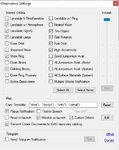Since the last update the program hangs when I click 'Read All Logs'. the bar progresses to about 20% and then stays there.
It still uses ~10% of my CPU and the used RAM increases at about 2 MB/sec. But even if I leave it running for hours it just keeps on using more and more RAM without showing any signs of life.
It still uses ~10% of my CPU and the used RAM increases at about 2 MB/sec. But even if I leave it running for hours it just keeps on using more and more RAM without showing any signs of life.

